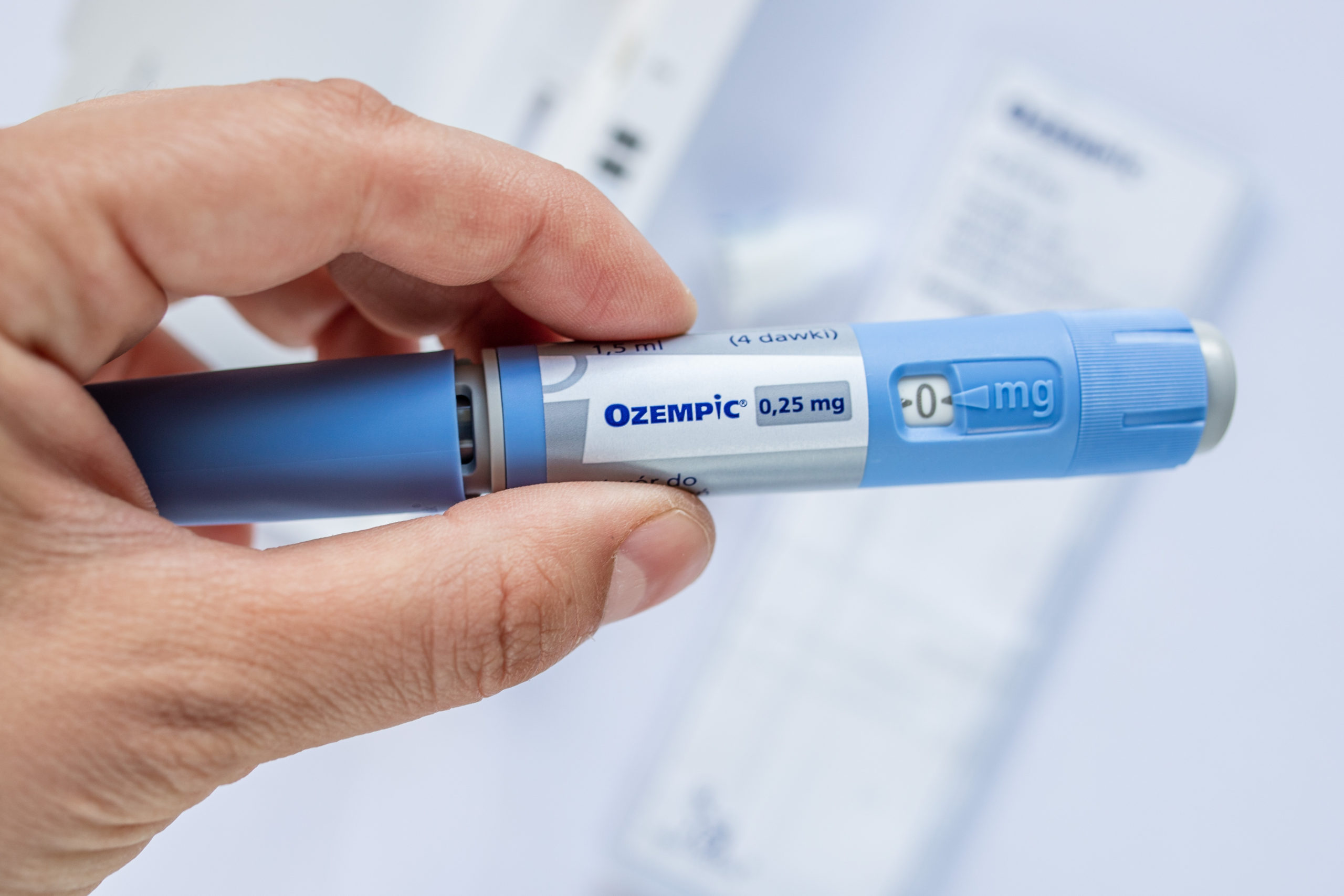
UP TO 40% OFF SITEWIDE






Cost of Semaglutide: Is it Affordable & Effective?


Table of Contents
- Summary
- Evidence-Based Effectiveness of Semaglutide
- Weight Loss Results (Clinical Proof)
- Diabetes Management Benefits
- Compounded Semaglutide Price
- Can You Take Ozempic (Semaglutide) if You Are Also Taking Metformin?
- Does Semaglutide Cause Weight Loss At That Price Tag?
- Semaglutide Side Effects: Does Benefit Justify the Cost and Side Effects?
- Foods To Avoid When You Are Taking Semaglutide or Ozempic
- How to Take Semaglutide?
- Wegovy vs Semaglutide
- Semaglutide (Ozempic) vs Tirzepetide (Mounjaro)
- Natural Alternatives to Semaglutide
- Berberine "Nature's Ozempic"
- Lifestyle Protocol
- Here are the critical points for you about the cost of semaglutide and more!
- Final Verdict
- About the author
Summary
- Semaglutide is a medication that helps with significant weight loss, averaging 10-15% of body weight, and improves blood sugar control in people with Type 2 diabetes.
- The drug is very expensive, costing over $1,000 per month without insurance, but manufacturer coupons and insurance coverage can drastically reduce the price.
- Compounded versions of semaglutide are not FDA-approved and carry serious safety risks, including contamination, despite their lower cost.
- For those unable to afford it, natural alternatives like berberine can provide similar metabolic support.
- It's important to be aware of the common side effects, such as nausea and vomiting.
- The final verdict is that semaglutide is most beneficial for people with diabetes or a high BMI who also have good insurance coverage.
Semaglutide costs $1200 a month; if you're one of the 99% of people who can't afford the average cost of Semaglutide, don't worry- there are options. Insurance companies, including Medicare, will often pay for the medication if you have good insurance, and pharmaceutical companies usually have coupons and other programs to help reduce co-pay costs.
Your doctor may not offer this information upfront, so it's important to do your research. And be nice to your pharmacist! They don't benefit from running coupons for you, but they're often willing to do it anyway because they're nice people, especially small neighborhood pharmacies.
I am not a big fan of CVS or Walgreens as they do not provide the personalized care and attention you guys deserve. So, make sure you take advantage of all the resources available to you, and you should be able to get your hands on this life-changing medication.
Evidence-Based Effectiveness of Semaglutide
Before we get to the money side of things, let’s talk about what makes semaglutide so popular in the first place. This drug isn't just a trend; it’s backed by some impressive clinical evidence. Semaglutide is a type of medication known as a GLP-1 receptor agonist. In simple terms, it mimics a natural hormone your body produces after you eat. This hormone tells your brain that you're full, which in turn helps to suppress your appetite. It also slows down the rate at which food leaves your stomach, so you feel full for longer. This two-part mechanism is what makes it so effective for weight loss.
Weight Loss Results (Clinical Proof)
The biggest headline grabber for semaglutide is its ability to help people lose a significant amount of weight. The STEP (Semaglutide Treatment Effect in People with Obesity) trials were a series of major studies that gave us a clear picture of its effectiveness. Participants in these studies lost an average of 10 to 15% of their total body weight over 68 weeks of treatment, a result that has truly changed the conversation around medical weight management.
But there's a big catch that people don't talk about very often. Semaglutide is a medication that requires lifelong use to maintain its effects. The moment you stop taking it, the appetite suppression and gastric slowing effects fade. A follow-up study on the STEP trials showed that a large portion of people, up to 80% of participants, regained most of the weight they lost within one year of stopping the medication. This isn't a failure on the part of the person; it’s just how the medication works. This is a crucial point to understand when considering its long-term cost and commitment.
Diabetes Management Benefits
Semaglutide was originally developed to help people with Type 2 diabetes. Its ability to lower blood sugar is truly remarkable. Clinical trials have shown that patients taking semaglutide saw their A1c levels (a measure of average blood sugar over three months) decrease by 1.5% to 2.0% more than those who were on a placebo. This is a significant drop that can make a huge difference in managing the condition and preventing future complications.
But the benefits don't stop there. Beyond its blood sugar and weight loss effects, semaglutide has shown a remarkable ability to protect the heart. For people with Type 2 diabetes who also have cardiovascular disease, semaglutide reduced the risk of heart attack, stroke, or cardiovascular death, according to a study. For this reason, it is particularly beneficial for Type 2 diabetics who have a BMI of 27 or higher, as they are often at higher risk for these cardiac events.
Compounded Semaglutide Price
Don't be fooled by so-called "compounded semaglutide"! There is no such thing as compounded semaglutide – they are counterfeit versions of the semaglutide molecule manufactured and patented by Novo Nordisk. These fake products may be sold at a fraction of the price of the real thing, but they are not subject to the same safety and quality standards. In addition, taking counterfeit drugs is illegal, and you could be risking serious health consequences.
So save yourself the hassle and stick with the real thing – semaglutide from Novo Nordisk. It's the only semaglutide backed by years of clinical research and has proven safe and effective in lowering A1c. Don't be fooled by imitations – stick with the real thing! Rybelsus and Ozempic are brand names for semaglutide. To learn more click here: Rybelsus or Ozempic I am sure a lot of you are already on Semaglutide.
And if you are, please let us know if your experience with Semaglutide is good or bad. Today I am going to answer the most common questions about Semaglutide. I will not try to sell the Semaglutide or deter you from it. I will just tell you what it is and you make up your mind. I will only cover the most common question so this is not a comprehensive review that may take hours otherwise.
Can You Take Ozempic (Semaglutide) if You Are Also Taking Metformin?
If you're looking for a diabetes treatment that works well with semaglutide, you may want to try metformin. Metformin is an oral medication used to treat type 2 diabetes. It works by decreasing the amount of glucose absorbed from food and increasing the sensitivity of cells to insulin.
The two medications work well together to control blood sugar levels Unless you have a tolerance problem to metformin to being with, semaglutide and metformin work well together.
Those people who can't tolerate metformin show great satisfaction with berberine products, especially the dihydro berberine. So if you're looking for a diabetes treatment that works well with semaglutide, check out berberine products. You may find that they provide the relief you're looking for.
Does Semaglutide Cause Weight Loss At That Price Tag?
More than one-third of participants receiving semaglutide lost more than 20% of their weight. Many patients experienced improvements in risk factors for heart disease, blood sugar levels and quality of life. With continued treatment, these positive effects are likely to persist and even increase. Semaglutide is a once-weekly injection that helps patients lose weight by reducing hunger and causing feelings of fullness.
It is an effective obesity treatment, and its safety and tolerability have been demonstrated in clinical trials. If you struggle to lose weight, talk to your doctor about semaglutide. It may be the right treatment for you. Regarding diabetes medications, there are two schools of thought: those who want to lose weight and those who don't.
Semaglutide is a medication that falls into the latter category - it's designed to help control blood sugar levels, but it comes with a pretty hefty price tag. For many diabetics, the question of whether or not to take medication for weight loss is a tough one. On the one hand, Semaglutide is an effective medication to help keep blood sugar levels in check.
On the other hand, it's essential to understand that you will need to stay on this medication almost indefinitely in most cases. If you stop taking Semaglutide, you're more likely to start gaining weight, and your blood sugar levels will likely rise within a few weeks. As with any decision, it's essential to weigh the pros and cons before deciding whether or not to take Semaglutide.
Semaglutide Side Effects: Does Benefit Justify the Cost and Side Effects?
This injectable medication has been shown to cause significant weight loss in those who take it, and people love it. However, Semaglutide isn't all fun and games.
The drug can also cause many side effects, from nausea and vomiting to headaches and back pain. And in some cases, it can worsen diabetic eye disease. So, if you're considering starting Semaglutide, carefully weigh the risks and benefits.
And if you do decide to take it, be sure to watch for any potential side effects. They might just surprise you. Semaglutide has been getting a bad rap lately, with people claiming it causes thyroid cancer. However, the truth is that Semaglutide only increases the risk of developing one specific type of thyroid cancer: papillary thyroid cancer.
This form of cancer makes up more than 90% of all cases of thyroid cancer, so while it's still a cause for concern, it's not nearly as rare as some people make it out to be. Additionally, while Semaglutide has been shown to cause thyroid cancer in rats, there is no evidence that it has the same effect in humans. So if you're thinking about taking this medication, don't let the scaremongering deter you - the risks are probably not as high as you think. Click on the link to learn more about Ozempic Side Effects.
Foods To Avoid When You Are Taking Semaglutide or Ozempic
If you're on Semaglutide, you might as well say goodbye to your favorite comfort foods. That's because fatty and greasy foods can worsen your side effects, especially nausea and stomach pain. And if you think that you'll just switch to spicy food, think again! Spicy foods can also trigger those pesky side effects.
So what's a poor Semaglutide-user to do? Well, you could always try bland foods like plain rice or chicken, but let's be honest; they're not winning any awards for taste anytime soon.
Or you could just tough it out and eat whatever you want, knowing that you might have to pay the price later with a little extra pain and suffering. At least you'll be able to enjoy your food! Avoid these foods if you are taking Semaglutide:
- Junk food
- Soda
- Pastries
- Ice cream
- Doughnuts
- Alcohol
- All processed foods
- Fried foods
- Turmeric
- Hot pepper
- Onions
- Chocolate
- Coffee
How to Take Semaglutide?
You found a way to afford the cost of semaglutide. Now you are curious how to use it the best way. When deciding how to take Semaglutide, there are many options available. However, the best thing about Semaglutide is that it is customizable so that you can tailor your dose to your individual needs. The recommended starting dose is 0.25 mg once a week, but after four weeks, you may need to increase your dosage to 0.5 mg or even higher, depending on your response to the medication.
After that, you can double the dose every four weeks if tolerated. The maximum dose is 2 mg per week. Semaglutide is not for people with type 1 diabetes or for people with diabetic ketoacidosis (increased ketones in your blood or urine). If you have a history of pancreatitis, talk to your healthcare provider about whether this medication is right for you. Some people are susceptible to Semaglutide and may only need a small amount of the medication, while others may need a higher starting dose.
Because it can be challenging to know how your body will respond to Semaglutide, it's essential to start with a small dose and gradually increase it as needed. If you're struggling to tolerate 0.25 mg of the medication, you can always try taking a lower dose by counting clicks between 0 and 0.25 mg. There are 17 clicks total, so you could start with eight clicks and see how your body reacts.
Wegovy vs Semaglutide
Now that we've covered the basics and the cost of semaglutide, including but not limited to the cost of semaglutide, let's talk about the two leading brands that sell it: Semaglutide and Wegovy. As you may have guessed, these two brands are identical medicines. They are both patented under different names because they studied the same molecule for different purposes.
Semaglutide is called Wegovy when it is used for weight loss and Semaglutide is used for diabetes. The Wegovy dose is slightly higher than Semaglutide, as it can go up to 2.4 mg, but you can go up to 2 mg with Semaglutide. So, if you're looking for a semaglutide brand to help you lose weight or manage your diabetes, either Semaglutide or Wegovy will do the trick! One of the main disadvantages of Wegovy is that most insurance companies will not cover the cost.
This means that the out-of-pocket cost of wegovy will be much higher than the cost of semaglutide. In addition, Wegovy is a new medication, and there is limited data on its safety and efficacy. Therefore, weighing the pros and cons of Wegovy before deciding whether or not to start taking it is essential.
Semaglutide (Ozempic) vs Tirzepetide (Mounjaro)
Tirzepatide is a novel peptide that offers patients with type 2 diabetes hope for better glycemic control. This injectable medication was compared to semaglutide, another diabetes medication, in a 40-week clinical trial. The results showed that tirzepatide was non-inferior and superior to semaglutide concerning the mean change in the glycated hemoglobin level from baseline to week 40.
This is exciting news for patients who are looking for better glycemic control. Tirzepatide is a once-weekly injection that is easy to use and well-tolerated. It can be used as monotherapy or added to other diabetes medications. If you are looking for an injectable diabetes medication that offers superior glycemic control, ask your healthcare provider about tirzepatide.
Natural Alternatives to Semaglutide
If semaglutide is not a viable option for you, whether due to cost, side effects, or a lack of insurance coverage, there are other paths to better health. At SugarMD, we believe in supporting your body with natural, evidence-based alternatives and healthy lifestyle habits.
Berberine "Nature's Ozempic"
Berberine is a compound found in several plants, including barberry and goldenseal. It has gained a lot of attention for its impressive benefits for blood sugar and metabolic health. It has been called "nature's Ozempic" because its mechanism of action is very similar in one key way: it activates an enzyme called AMPK, which is a key regulator of metabolism. This activation helps improve insulin sensitivity, reduce glucose production in the liver, and slow down the absorption of carbohydrates in your gut. All of this contributes to better blood sugar control and can even aid in healthy weight management.
The cost difference is staggering. While semaglutide costs close to a thousand dollars a month, a high-quality berberine supplement typically costs around $30 to $50 a month, making it a fraction of the price. At SugarMD, our Super Berberine formula is unique because it uses dihydroberberine, which has been shown to have up to five times greater absorption than regular berberine.
Lifestyle Protocol
Remember that supplements are just one part of the picture. The most powerful tools you have are often simple lifestyle changes.
- Diet: One of the most effective strategies is time-restricted eating. This is a form of intermittent fasting where you limit your eating to a specific window, such as an 8 or 10 hour period each day, and fast for the rest. This can help improve insulin sensitivity and support your body’s natural metabolic processes.
- Exercise: You don’t need to train for a marathon to see results. Something as simple as a 10-minute walk after each meal has been shown to cut glucose spikes by up to 30%. This is because your muscles use some of that glucose for energy, preventing it from staying in your bloodstream.
- Supplements: In addition to berberine, other supplements like cinnamon and chromium can work synergistically to support healthy blood sugar.
Here are the critical points for you about the cost of semaglutide and more!
- The cost of Semaglutide(Ozempic) is high but controls blood sugar. Semaglutide lowers blood sugar. This medication is usually taken forever. Semaglutide withdrawal can cause weight gain and high blood sugar. Think about Semaglutide before taking it.
- Semaglutide is serious. Nausea, vomiting, headaches, and backache are side effects. Diabetic eye disease can worsen. Semaglutide has risks and benefits. Take it with caution. Possibly.
- Semaglutide allegedly causes thyroid cancer. Semaglutide causes a very rare type of thyroid cancer in rats, not humans. The risks of this medication are probably not as high as you think.
- Semaglutide prohibits comfort foods. Fatty foods aggravate nausea and stomach pain. Avoid spicy food. Spicy foods are harmful.
- 99% of people who can't afford Semaglutide have options. Good insurance often covers medications, and drug companies offer coupons and other programs to reduce co-pays. Do research if your doctor doesn't tell you.
- Semaglutide's dosing is customizable. After four weeks, depending on your response, you may need to increase the dose to 0.5 mg or higher. Some are sensitive to Semaglutide and need a small dose, while others need a higher dose. Start with a small dose of Semaglutide and gradually increase it. If 0.25 mg is too much, try counting clicks. See how your body reacts to 8 clicks.
- Semaglutide and Wegovy are Semaglutide brands. Both brands are identical. Both patents study the same molecule for different reasons. Wegovy and Semaglutide contain semaglutide. Wegovy is 2.4 mg versus 2 mg for Semaglutide. Semaglutide and Wegovy help with weight loss and diabetes.
Final Verdict
So, after all this information, is semaglutide a good option? There is no one-size-fits-all answer. It truly depends on your individual health needs, financial situation, and what you’re willing to commit to.
Semaglutide might be worth it if:
- You have a confirmed diagnosis of Type 2 diabetes and your insurance provides good coverage. The cardiac and blood sugar benefits make it a powerful tool for long-term health.
- You have a BMI greater than 35 and have other obesity-related health issues, such as high blood pressure or high cholesterol.
It might not be worth it if:
- You would be paying cash for it without any insurance or manufacturer discounts. The cost is simply not sustainable for most people.
- Your weight loss goals are minimal (less than 10% of your body weight). The risks and costs may not outweigh the potential benefits for modest goals.
At SugarMD, our primary focus is on empowering you with the knowledge to make the best decisions for your health. Whether you choose to explore natural alternatives like our Super Berberine or work with your doctor on a prescription, remember that you are in control of your health journey.
About the author
Who is Dr. Ergin? Dr. Ahmet Ergin is an endocrinologist interested in and passionate about diabetes care. Dr. Ergin earned his medical degree with honors at Marmara University School of Medicine in Istanbul, Turkey. Then, he completed his internal medicine residency and endocrinology fellowship at Cleveland Clinic in Cleveland, Ohio.
He is a board-certified Internal Medicine and Endocrinology, diabetes, and metabolism physician. He is also a certified diabetes education specialist. Disclaimer: Any information on diseases and treatments on this website is for general guidance only and must never be a substitute for the advice your doctor or other qualified healthcare professional provides. Always seek the advice of your physician or other qualified health care professional with questions you may have regarding your medical condition.
Written By Dr. Ahmet Ergin
464 total articles
Meet Dr. Ahmet Ergin, a highly skilled and dedicated endocrinologist with a passion for diabetes care. Dr. Ergin earned his medical degree with honors from Marmara University in Istanbul. He completed internal medicine residency and endocrinology fellowship at Cleveland Clinic. Dr. Ergin is board-certified in Internal Medicine, Endocrinology, Diabetes, and Metabolism due to his vast medical expertise. He's a certified diabetes educator, author of “The Ultimate Diabetes Book,” and founder of “the SugarMD YouTube channel.” Dr. Ergin offers exceptional diabetes care to his patients in Port Saint Lucie, FL, helping them manage effectively. For a closer look into his insights and experiences, connect with Dr. Ahmet Ergin on LinkedIn, Instagram, and YouTube.”
Disclaimer: These statements have not been evaluated by the Food and Drug Administration. Information on this website isn't intended to treat, cure or prevent any disease. Discuss with your doctor and do not self-treat.
Products











